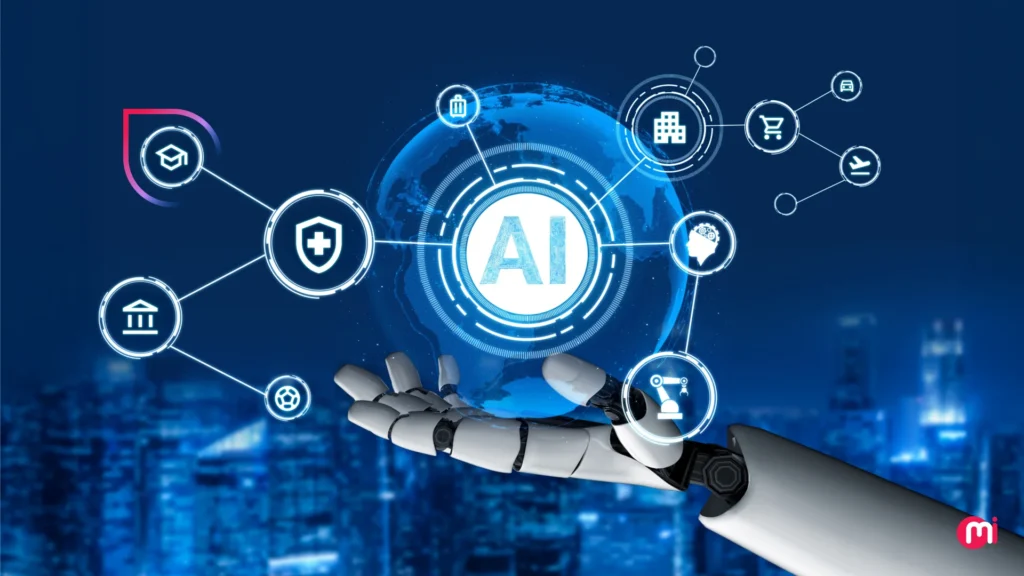Generative AI is revolutionizing industries across the board, much like the internet transformed communication. The question arises: are businesses prepared to reimagine their processes in a world where GenAI plays a pivotal role as a co-creator? This article delves into the various use cases of Generative AI by industry, providing insights into the potential of this technology and more.
Every successful business leader understands that growth stems from surpassing customer expectations, not just meeting them. GenAI emerged as a pleasant surprise in this regard. Think back to your initial encounter with ChatGPT – it felt like a scene straight out of a science fiction movie. Today, text generation, image generation, audio and music generation, video generation, 3D modeling, code generation, data synthesis, chatbots, and conversational AI have become commonplace tools that we use in our daily lives.
While Generative AI has seamlessly integrated into our work routines, it continues to astonish us with its time-saving and cost-reducing capabilities across various industries. Before delving into how industries have harnessed GenAI development services to create innovative tools and what the future holds, let’s take a glance at some key statistics of Generative AI use cases across different sectors.
Some of the most notable use cases of Generative AI in businesses include various GPTs, with approximately 54% of businesses incorporating ChatGPT into their operations and 75% of users worldwide leveraging it to automate tasks. Let’s explore more statistics related to GenAI use cases across various industries:
Healthcare:
- 85% of healthcare leaders in the US are exploring or have already adopted GenAI capabilities.
- 53% of healthcare organizations globally are integrating GenAI to enhance healthcare systems.
BSFI:
- 84% of US financial services leaders are increasing investment in GenAI to enhance existing systems.
- GenAI could augment up to 34% of tasks performed by bank employees, boosting efficiency and productivity.
Insurance:
- 44% of insurance firms believe GenAI will significantly enhance user experience and personalization.
- 72% of insurers say GenAI improves risk management and compliance measures.
Education:
- 59% of educators state that GenAI saves time, with the median savings being 3-5 hours per week.
Sports:
- The generative AI in sports market is growing rapidly, reflecting a 30.5% CAGR.
Real Estate:
- GenAI adoption in real estate is projected to grow at an 11.52% CAGR, hitting 1,302.12 million by 2034.
- GenAI could generate value for the real estate sector between USD 110 billion to USD 180 billion.
Travel:
- Approximately 73% of travel leaders have the budget and resources to implement GenAI solutions for cost-saving.
- As many as 80% of travelers are open to using AI for organizing their trips.
Retail:
- Over 80% of retail and CPG companies are implementing or piloting GenAI projects.
- The GenAI retail market is expected to reach $31 billion by 2028.
Automotive:
- 75% of automakers plan to integrate GenAI into vehicles by 2025 for predictive maintenance and driver assistance.
- 69% of decision-makers in automotive R&D departments prioritize early adoption of GenAI technologies.
Generative AI is reshaping industries by automating content creation, enhancing customer experiences, and accelerating research and development processes. From healthcare to finance, education, sports, real estate, travel, retail, and automotive sectors, GenAI is paving the way for a smarter and more efficient future.
In healthcare, GenAI is revolutionizing diagnostics, drug discovery, mental health support, and fitness recommendations. In BFSI, it is transforming fraud detection, risk assessment, personalized banking, and financial planning. The education sector benefits from personalized learning, dynamic curriculum design, and virtual AI tutors. Sports enterprises leverage GenAI for customized training plans, game strategies, injury risk assessments, and player value predictions.
Real estate and construction industries witness the impact of GenAI through hyper-personalized property tours, architectural blueprints, optimized designs, and sustainable material options. Travel and hospitality sectors benefit from personalized itineraries, real-time modifications, smart hotel room configurations, and virtual travel influencers. Media and entertainment industries utilize GenAI for CGI characters, hyper-personalized music playlists, interactive episodes, and real-time translations.
Retail and ecommerce sectors leverage GenAI for personalized shopping experiences, inventory optimization, warehouse efficiency, and AI-powered chatbots. The automotive industry utilizes GenAI for unique car designs, personalized vehicle customizations, synthetic road scenarios, and adaptive driving styles.
At MindInventory, we specialize in developing intelligent and scalable GenAI solutions that save time, cut costs, and drive innovation for businesses of all sizes. Our custom-built GenAI solutions have led to significant reductions in manual effort, time per task, cost savings, and faster decision-making for our clients.
As industries worldwide harness the power of Generative AI to develop groundbreaking tools and transform their operations, it is essential to understand the ethical considerations associated with this technology. These considerations include bias in AI outputs, misinformation, copyright issues, job displacement, data privacy, and AI accountability. To address these concerns, businesses must implement AI transparency, ethical guidelines, and human oversight to ensure responsible use of Generative AI.
Generative AI is not just the future – it is happening now. Businesses must embrace this revolutionary technology to lead the transformation and drive real-world impact. Let’s build a GenAI solution that propels your business growth. Talk to our GenAI experts today to explore the possibilities of Generative AI in your operations.
FAQs on Generative AI:
- What does generative AI mean? Generative AI is a subfield of AI that creates content like text, images, music, and videos based on learned patterns from existing data.
- How does GenAI differ from other types of AI? Generative AI creates new content, unlike traditional AI models that analyze or classify existing data.
- What is a real-life example of generative AI? Real-life examples of GenAI include Google’s Bard, DALL-E, Ada from Synthesia, and ChatGPT.
- What are the ethical considerations associated with Generative AI? Ethical concerns related to Generative AI include bias in AI outputs, misinformation, copyright issues, job displacement, data privacy, and AI accountability. Businesses must implement ethical guidelines and human oversight to ensure responsible use of GenAI.

